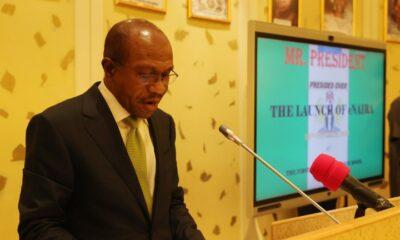As scarcity of naira notes worsens across the country following the cash redesign and swap policies of the Central Bank of Nigeria (CBN), governors of the 36 states of the federation have stated that the situation may have severe negative impacts on the nation’s economy that the incoming administration would not be able to handle.
They alleged CBN and federal government of seizing Nigerian currency and currency exchange policy envisaged under S20(3) of the CBN Act, 2007, adding that the alleged currency confiscation is to make the liquidity provided to the general public to be grossly insufficient due to the restrictions placed on the amount that can be withdrawn regardless of the amount deposited.
They asked the federal government and the apex bank to do the needful by carrying out the suggestions of critical stakeholders who have said more naira notes should be printed while the old and new ones should be used simultaneously till the former phases out.
For the governors, there might be another economic recession if President Muhammadu Buhari and the CBN fail to the Council of State and Nigerians.
Investors King reports that the governors, under the umbrella of the Nigeria Governors Forum (NGF) met last weekend and urged Buhari and Godwin Emefiele, the CBN Governor to review their policies with a view to ameliorating the suffering of the masses, adding that the damage is already crippling businesses across the country.
According to them, should the government at the centre and the apex bank shun the suggestions Nigerians have given to them, the next government would have a rough start economically.
Speaking for the governors, Chairman of the NGF and Sokoto State governor, Aminu Tambuwal, said they feel the pains of Nigerians and that they were determined to employ all legitimate channels to ease the situation.
He said there is a great difference between the CBN Naira redesign policy backed by Section 20 (3) of the CBN Act, 2007 and the aspirational policy of going cashless, adding that both of which are mutually exclusive at this time.
Tambuwal described CBN’s approach as worrisome and that the policies have been robbing Nigerians of their liberties and rights to transact freely with the naira. He said the governors view the cashless policy as a draconian approach that has inflicted pains and misery on Nigerians.
According to him, CBN did not consider that Nigeria has been having steady increase in its nominal Gross Domestic Product (GDP) and the impacts of the debts taken by the Federal Government through the Ways & Means advances and other negative consequences of its policies lately.
He also identified Naira black market, severe food inflation, variable commodities prices based on the method of exchange, and long queues as well as crowds around Automated Teller Machines (ATMs) as other bad results of the policies.
Meanwhile, the forum, according to Tambuwal, urged the federal government and the CBN to respect the Rule of Law and listen to the voice of reason expressed by Nigerians and several other stakeholders including the Council of State, before the damage to our economy becomes too great to fix by the next administration.
Aside lamentations of bank customers, owners of small scale businesses and entrepreneurs have decried the negative effects tye naira swap have been having on their sales.
While some said their businesses have folded up, others note that they no longer get patronage as their customers have not been showing up to patronise them since the scarcity started.
National president of Association of Small Business Owners of Nigeria (ASBON), Dr Femi Egbesola, lamented that micro businesses across the country have been affected.
He urged that urgent measures should be taken by the federal government and the apex bank to resuscitate the dying economy.




 Naira4 weeks ago
Naira4 weeks ago




 Naira4 weeks ago
Naira4 weeks ago


 Naira3 weeks ago
Naira3 weeks ago


 News4 weeks ago
News4 weeks ago
 Travel4 weeks ago
Travel4 weeks ago




 Naira4 weeks ago
Naira4 weeks ago


 Jobs3 weeks ago
Jobs3 weeks ago
 Naira3 weeks ago
Naira3 weeks ago

















